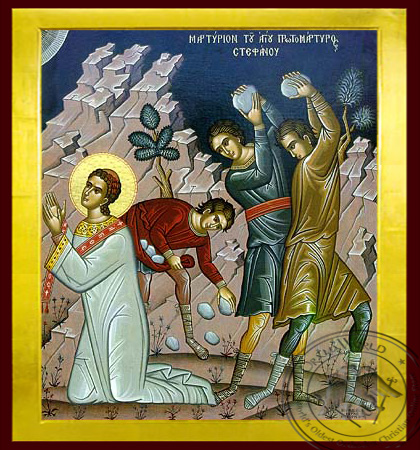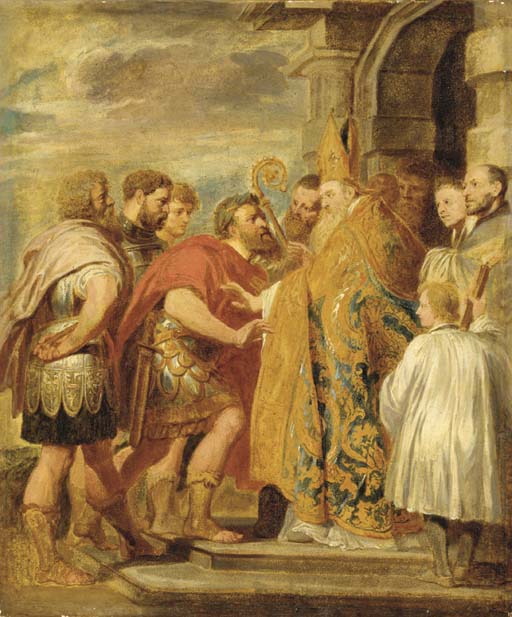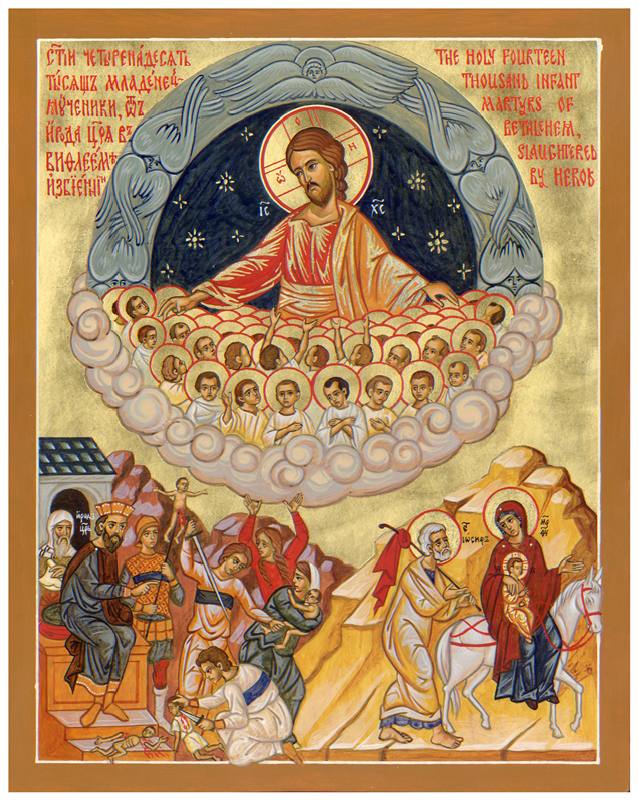
Luke 16:10-15 (Matins)
Acts 6:8-15; 7:1-5, 47-60
Matthew 2:13-23
Dangerous Holiness
And all who sat in the council, looking steadfastly at him,
saw his face as the face of an angel.
In the Name of the Father and of the Son and of the Holy Ghost. Amen.
|
Some readers have wondered why the Hermitage has neglected St. Stephen Day (Saturday).
I ask pardon for this .... as well as pardon for a greater audacity:
that we celebrate the Protomartyr's feast today with a Solemn Mass two days later.
I ask this as a mercy shown to an old priest.
That we should celebrate it concurrently with the Feast of the Holy Innocents will become apparent.
St. Stephen has special significance for me.
It was my saint-name at birth.
As I matured,
St. Stephen continued to resonate in my life.
When I awakened to my responsibilities as a disciple
—
seeing religion as something more than service
—
I went to the local court to normalize the spelling of my name, changing the "v" to a "ph."
One must appear before a judge to effect this.
The day assigned me,
a day indifferent to the civil authority,
turned out to be Ash Wednesday.
When my seriousness and knowledge of the Anglo-Catholic faith increased,
I learned that the feast day of England's Protomartyr, St. Alban, was June 22,
my birth date.
Of course,
my devotion to St. Stephen went to another level when I walked away from a
career as senior researcher at Bell Labs and faculty member at MIT
in exchange for
the lowliest place in Christ's Church.
In time,
I joined a Franciscan apostolate to prostrate Haiti
seeking a deeper sense of poverty, chastity, and self-denial,
which a remant of my community continues to follow after we left Haiti.
During my search for "real vocation"
(a phrase I learned from Christians I respected),
I followed a journey that took me through three communions and many dioceses,
discovering a most important principle:
holiness is powerful, dangerous, and can rankle
religious and clergy deeply as little else can.
 I suppose all children imagine that
the basic virtues
can somehow reside together in one faithful breast:
fear of God,
reverence for family,
and
love of country.
But even the most indifferent university student learns along the way that,
in fact,
none of these things has ever rested together in harmony.
We might say that the history of Western Civilization
is a history of conflict among these things.
Certainly, this was true from the start in the long relationship between the
Christian Church and the Roman Empire
(including the Eastern Empire).
The established Church struggled from its beginnings in the fourth century to be independent of the Emperor.
St. Ambrose's excommunication of the Emperor Theodosius the Great, barring him from the cathedral,
continues to represent this struggle.
The authority of the civil order can never be greater than that of the Church.
The secular sphere is different,
and
Christians are taught to render unto Caesar what is Caesar's only.
I suppose all children imagine that
the basic virtues
can somehow reside together in one faithful breast:
fear of God,
reverence for family,
and
love of country.
But even the most indifferent university student learns along the way that,
in fact,
none of these things has ever rested together in harmony.
We might say that the history of Western Civilization
is a history of conflict among these things.
Certainly, this was true from the start in the long relationship between the
Christian Church and the Roman Empire
(including the Eastern Empire).
The established Church struggled from its beginnings in the fourth century to be independent of the Emperor.
St. Ambrose's excommunication of the Emperor Theodosius the Great, barring him from the cathedral,
continues to represent this struggle.
The authority of the civil order can never be greater than that of the Church.
The secular sphere is different,
and
Christians are taught to render unto Caesar what is Caesar's only.
St. Stephen's story plays out at the next level of detail:
within the Divine institution.
Christians are furiously persecuted by those close to the Zion Temple:
As for Saul, he made havoc of the church, entering every house,
and dragging off men and women, committing them to prison.
(Acts 8:3)
|
It is the religious establishment that seeks to eradicate holiness.
What is it that should so infuriate the Pharisee, Saul of Tarsus, and
his brethren?
Certainly,
they are surrounded by those who are indifferent to God altogether
—
Hellenized Jews who seek only upward mobility in occupied Palestine
(desiring to become tax collectors and officials of the Roman society).
They coexist with the aristocratic Sadducees, who are much less rigorous and this-worldly in a
faith more grounded in custom than real devotion.
They are surrounded by pagans whose presence near the Temple is an affront to God.
Why should they single out Christians,
who are so similar to the Essenes,
whom they do not even mention?
The answer is simple:
Christians display holiness.
The Essenes are more contemplative in their manner of daily life
(so far as we can tell).
But like them,
the Christians are purists,
practitioners of the "old faith,"
the religion of the Patriarchs.
The Pharisees know
and
the Temple authorities in general know,
what their Master, Jesus of Nazareth, thought of their animal-sacrifice religion
imported from Babylon.
But unlike the Essenes,
the Master has sent them out into the world
to preach the good news of God-with-us and of His religion being restored to the earth.
Our new High Priest is not in the Zion Temple rota.
He is a priest after the order of Melchisedec,
that mysterious figure ministering to Abraham with wine and bread.
Our new religion is holiness,
literally,
holiness,
sanctification,
Theosis.
Do you know that few things shake people at the level of their inmost parts as deeply as holiness?
Sometimes this encounter inspires life-change,
but
most often it infuriates people.
I recall a Roman Catholic diocese
I served
where the majority of priests believed that "real religion was service"
(that is what they preached from the pulpit).
They never spoke of holiness or its dark threat, which is sin.
They did not like the word holy.
Indeed,
they viewed the priesthood as a job
and
went about living their private lives that,
shall we say, were not compatible with the Catechism of the Catholic Church.
Meantime,
at a Roman Catholic college within the diocese,
the
chaplain had been "fired" by nuns there for elevating the
Consecrated Host at Mass.
"He was warned," they told me.
They were rankled that he felt the locus of the holy were the Consecrated Gifts
and
that all should bow before them.
The nuns thought they knew better.
They felt that the gathered people,
in whatever state of life they might be found ....
these should be the cause for reverence.
I learned more about this,
for the same religious order also ran a hospital in the state's largest city
where I paid pastoral visits to patients.
There,
I heard a
Eucharistic Minister ask,
"What if the patient is watching 'trashy' television
as we enter the room
with Communion?"
(I believe I heard the name "Jerry Springer" mentioned.)
The nun in charge of this ministry was offended at the question.
"Who can say where the holy is?"
she asked.
"Should not we defer to the patient watching television?
This may be the holy!
We must not be judgmental.
Do not judge!"
Heresy was common, even taught in the college classrooms.
And
a heady spirit of defiance and rebellion fueled religious and priests
alike
who told me with excitement that the Church was on a tipping point,
about to usher in a new age
—
an age I saw, as I discerned this extraordinary claim more deeply,
that closely resembled the Episcopal Church:
same-sex marriage, ordination of women, emphasis on social liberation movements.
Indeed, these people described themselves to be on a great arc of liberation.
But very little of it had anything to do with the teachings of Jesus Christ
or
with Scripture.
I discussed these things with the Bishop as I found opportunity.
He told me in a breezy tone that, "Father, the Church has many 'zip codes.'"
When National Public Radio celebrity, Krista Tippett,
came to our state to broadcast one of her On Being programs,
she invited a priest of our diocese to join various liberal Protestant ministers in the discussion.
The topic would be God's approval of the homosexual lifestyle (which they took for granted).
The Bishop selected one of our older priests,
a man who also held an M.D. from Harvard
in addition to his M.Div. and ordination.
As I listened to the broadcast I heard this priest assert
that the Roman Catholic church was completely "on-board" with same-sex couples.
In fact,
some of his favorite couples in his parish ministry were "gay."
There was one priest, however, who infuriated the Bishop.
He was a very holy man
—
humble,
devout,
and
dedicated to his ministry.
He prayed his Divine Office faithfully and in Latin.
He celebrated a Latin Mass.
He was a serious confessor who grieved over the sins of his people.
He lived out an oblation.
The Bishop told me once in clipped tones,
"He doesn't think the rest of us are Catholic."
I asked my spiritual director,
"Why do all these priests hate him?"
"Well," he told me,
"not so very long ago,
a Benedictine abbot had been elected Bishop of our Diocese.
The priests responded by demonstrating in front of the episcopal residence
even as he was moving in
with signs indicating that they would not pray the Office.
'We're not monks.
We're not monks,'
they chanted.
I think the other priests believe that this 'Latin Mass priest' is
trying to show everyone up."
But it was not this priest that so deeply rankled everyone.
It was holiness.
They felt themselves to be accused.
No one brought a charge.
Indeed,
everyone in this Diocese practiced the two great commandments of our age:
"Do not judge"
and
"Live and let live."
No matter,
they beat the air furiously with their fists imagining they
were fighting off
an unseen menace.
On the other side,
complete passivity.

Is not this the scene that is set in Bethlehem?
No one is conspiring against Herod.
No one is planning a palace coup
or
hatching any kind of plot.
Yet, he feels threatened by an unseen menace.
Yes,
he had met emissaries from a foreign land,
the Three Magi,
but they were gentle and kindly.
Anyway,
they were not seeking him.
They were following a pure, white star seeking holiness.
All ahead and around and above Herod was holiness.
But this holiness infuriated him.
He summoned armies to campaign against it, literally
destroying the lifeworld around him
in the form of children.
No one threatened.
No one conspired.
No one .... was there.
Only holiness:
pure,
gentle,
beautiful,
and
innocent holiness.
Is this not a precise description of the feverish and shrill
animus around what are called "abortion rights"?
So much innocence,
so much blood .... all greatly magnifying the holiness of the scene
to a point where it has become the greatest oblation of our era ....
offered to an idol.
No matter,
it
cannot but be holiness on an unimaginable scale
—
the outpouring of holy, human blood in staggering volumes,
far exceeding any battlefield of military history.
And the fallen?
They are blameless,
pure,
innocent,
holy.
No one and nothing
have threatened these murderous mothers.
They simply have entered
the holy precincts of human sexuality,
and,
after that,
they have
met with the natural unfolding of their own lives ..... and vocation of motherhood,
holy vocation.
They beat the air with their fists.
My own journey of vocation has ended.
The Church to which God has led the Hermitage
is holy as I had always imagined the Church to be
—
our Patriarch who speaks plainly and powerfully about the imperatives of holy life;
our humble and kindly Metropolitan who radiates holiness;
serious priests living out sacrificial vocation through intentional poverty.
(They are not on salary in any diocese.)
And I learned a most encouraging fact during the week of my ordination in the Russian Orthodox Church.
I learned that priests are swiftly deposed for conduct unbecoming the Church.
Finally:
real vocation.
☦
What is it that led to the torture and murder of the first Christian martyr?
It was his holiness.
He does not accuse them.
Indeed,
at his death, St. Stephen intercedes for his assailants:
Then he knelt down and cried out with a loud voice,
"Lord, do not charge them with this sin."
(Acts 7:60)
|
No doubt,
this act of kindness enraged them the more.
The entire holiness movement he represented enraged them.
That movement taught that animal sacrifice has no effect
on the life of a man or woman.
His accusers heard Stephen say that Jesus Christ will "change the customs" (Acts 6:14) practiced in the Temple.
Stephen told the people that they had resisted the Holy Spirit
and
had ignored the direction of angels (7:53).
And this infuriated them:
"they were cut to the heart,
and
they gnashed their teeth" (Acts 7:54).
Meantime,
Stephen himself was filled with spiritual power.
He was a wonderworker (Acts 6:8).
His face shone like an angel.
These are the marks of
Theosis.
They point to the Holy of Holies of the First Temple,
where the goal of spiritual life was glorification,
united with God in His Glory,
following the Lord Jesus Christ ....
as we hear it said over and over again in the Gospel According to St. John.
What is the great difference between the Western Catholic Church and the Eastern Orthodox Church?
It is holiness.
Powerful,
life-transforming,
and
dangerous holiness.
Our Church will be the last to bow to culture.
She will be the last to compromise in any way with the world and its values.
And
when humanity makes its last stand,
she will not be far off.
For she is holy and a guardian of the Kingdom of Heaven.
In the Name of the Father and of the Son and of the Holy Ghost.
 I suppose all children imagine that
the basic virtues
can somehow reside together in one faithful breast:
fear of God,
reverence for family,
and
love of country.
But even the most indifferent university student learns along the way that,
in fact,
none of these things has ever rested together in harmony.
We might say that the history of Western Civilization
is a history of conflict among these things.
Certainly, this was true from the start in the long relationship between the
Christian Church and the Roman Empire
(including the Eastern Empire).
The established Church struggled from its beginnings in the fourth century to be independent of the Emperor.
St. Ambrose's excommunication of the Emperor Theodosius the Great, barring him from the cathedral,
continues to represent this struggle.
The authority of the civil order can never be greater than that of the Church.
The secular sphere is different,
and
Christians are taught to render unto Caesar what is Caesar's only.
I suppose all children imagine that
the basic virtues
can somehow reside together in one faithful breast:
fear of God,
reverence for family,
and
love of country.
But even the most indifferent university student learns along the way that,
in fact,
none of these things has ever rested together in harmony.
We might say that the history of Western Civilization
is a history of conflict among these things.
Certainly, this was true from the start in the long relationship between the
Christian Church and the Roman Empire
(including the Eastern Empire).
The established Church struggled from its beginnings in the fourth century to be independent of the Emperor.
St. Ambrose's excommunication of the Emperor Theodosius the Great, barring him from the cathedral,
continues to represent this struggle.
The authority of the civil order can never be greater than that of the Church.
The secular sphere is different,
and
Christians are taught to render unto Caesar what is Caesar's only.

